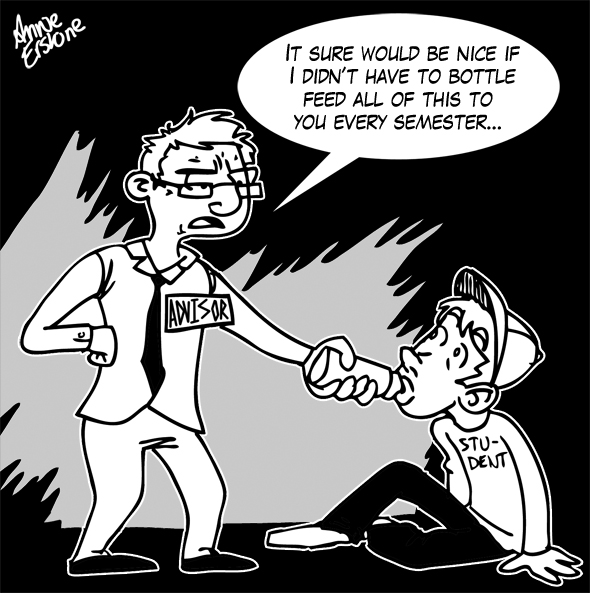STAFF EDITORIAL: Advising shouldn’t be a dreaded task
November 9, 2010
THE ISSUE: Often, a lack of effective communication between students and academic advisers leads to confusion in class registration.
OUR STANCE: Students and advisers should both take responsibility for mistakes and work harder to reach one accord.
‘Tis the season. Thanksgiving – when good tidings and the spirit of giving loom, so does the arrival of class registration and advising.
For the next few days, advisers will have appointment charts hanging on their doors and students will struggle to wake up at 5 a.m. to grab the last spot in a class.
But the class registration process doesn’t always run smoothly. With graduation on the hinges, many upperclassmen blame poor academic advising for the news that they may not walk, while some advisers blame the students. But whether a student has too many unneeded credits or not enough credits, there are ways both parties can improve.
Students, be proactive. Take the lead in finding what you need to track your progress, and don’t expect your adviser to do all the work. Register in a timely manner, and use the services available to you, such as the course catalog, graduation planning sheets offered through your major department and the Interactive Curriculum and Academic Progress (iCAP) program.
Available on TopNet, iCAP is an audit system that allows you to view all requirements needed for your major and minor, courses you’ve completed and courses you still need to take.
Frieda Eggleton, WKU registrar of 24 years, said iCAP was established four years ago to eliminate the tedious process of keeping up with coursework and to ensure that students have easy access to their full academic progress reports.
She recommends submitting an iCAP audit at least twice a semester.
The Herald suggests that advisers explain iCAP to their students during their initial advising sessions and offer to spend a few minutes reviewing it with them. From there, it is fair to pass more of the responsibility to the student.
And though college is about gaining knowledge to become well-rounded, advisers should avoid recommending courses that students don’t need if there is no space for them. Trimming your schedule to only what you need can save money and time during the semester.
Advisers should have an open-door policy for their students, as questions may come up at anytime. And though we understand advisers sometimes have hundreds of advisees, students should be welcomed, not rushed; no one wants to feel like a number.
In addition to advisers, there are iCAP tutorials and help sections available on wku.edu/icap, and any questions about it can be directed to Eggleton.
The path to graduation isn’t always easy. And there are far too many obstacles students already face – parenthood, finances, full-time jobs – so registration and advising shouldn’t be one of them.
Students, if you have questions about your progress, ask. Advisers, if students need your help, help them willingly and thoroughly. You’re working toward the same goal, so it only seems right that you work together to turn dreaded advising sessions into productive steps toward reaching that goal: graduation.
This editorial represents the majority opinion of the Herald’s 10-member editorial board.






















